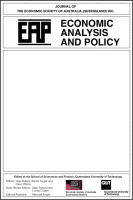ECONOMIC ANALYSIS AND POLICY
Número:
2
Publicado:
Clasificación JEL:
E26, E32, H26, O17

Lo más reciente
Luis E. Arango, Luis E. Arango, Luz Adriana Flórez, Carlos Esteban Posada
Oscar Iván Ávila-Montealegre, Anderson Grajales, Juan José Ospina-Tejeiro, Mario Andrés Ramos-Veloza
Olga Lucia Acosta Navarro, Andrés Felipe Chitán-Caes, Ana María Iregui-Bohórquez, Ligia Alba Melo-Becerra, María Teresa Ramírez-Giraldo, Jorge Leonardo Rodríguez Arenas
Within the literature on business cycles featuring underground activities, there is an approach based on the arguable premise that these are countercyclical. This paper develops a real business cycle model without such an assumption. Preferences are additively separable in formal and underground labor. Further, leisure time is spent on irregular work and non-market activities. Simulations permit examining how the model performs and comparing the results with related findings. Also, computational experiments allow analyzing the effects of taxes, enforcement and tastes for underground labor on aggregate fluctuations. These experiments offer a comprehensive view of the cyclical implications of the shadow economy.
